- About us»
- Net income calculator»
- Population aging»
-
-
- Unemployment structure in the Visegrad region
- Development in least developed regions
- Detailed statistics of least developed regions in Slovakia
- Statistics of the least developed regions in Slovakia
-
- Average wage
- Material need benefits
- Meal allowance
- Counties of Slovakia
- Inflation
- Living and Subsistence Minimum
- Unemployment of Czechia and Slovakia
- NACE Classification
-
- Life expectancy
- Gender differences
- Youth unemployment and NEET
- Minimum wage in EU
- Unemployment rates of different age groups
- Share of salaries on GDP
- Long term unemployment
- NEET
- Unemployment rate
- Percentage of employees ususally working at nights
- Employment rate
-
- Bratislava and surroundings
- Kopanice
- Danube river
- lower Vah river
- middle Vár river
- upper Nitra river
- lower Nitra river
- Mining cities
- Kysuce a Orava
- upper Vah river - Liptov
- Spiš cities
- upper Hron river
- Juhoslovenská kotlina
- Košice fold and Torysa river
- upper Zemplín
- lower Zemplín
- EU regions
- NUTS3 regions of Slovakia
- LAU1 dataset
-
-
- Projects and activities
- Inclusive growth»
- Good work
- Project SKRS
- Social system – reality and vision
-
- Education of unemployed
- Young unemployed not taking part in education
- Proposal to change the system of education funding
- Library
- News»
- Contact
Greece – EL
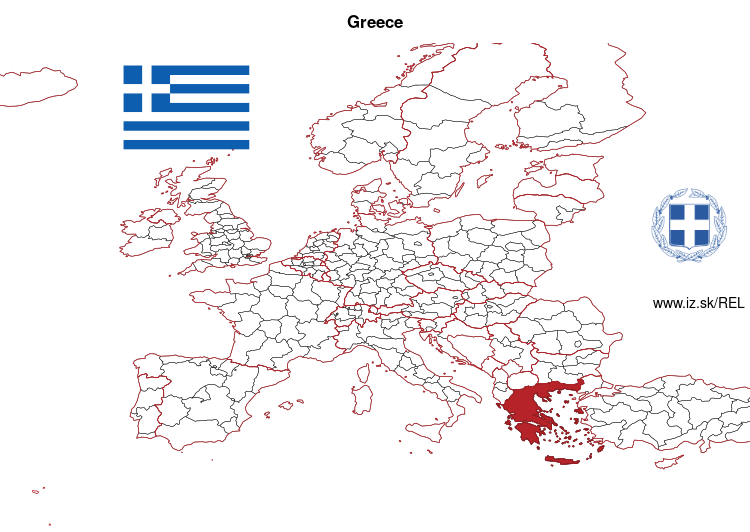
Greece slovensky: EL
Subregions: Attica Region, Aegean Islands and Crete, Northern Greece, Central Greece
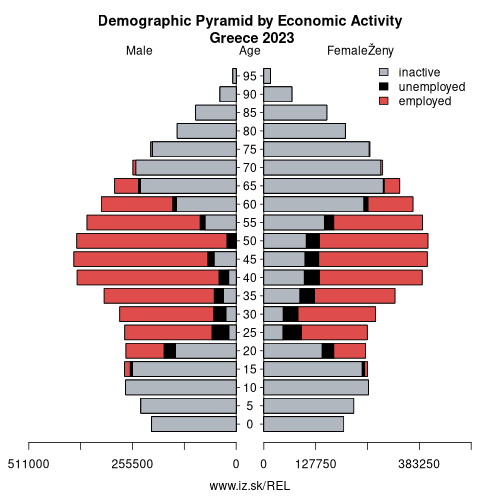
Unemployment
| Indicator | Period | Value |
|---|---|---|
| Unemployment | ||
| unemployment rate | 2025q3 | 8.2 |
| youth unemployment rate | 2025q3 | 18.3 |
| unemployment rate of low educated people | 2025q3 | 11.2 |
| Long term unemployment | ||
| long term unemployment | 2025q3 | 4.8 |
| share of long term unemployed | 2024 | 53.6 |
Composition of population according to age group, education and economic activity, Greece
| Age group | Low education | Middle education | High education |
|---|---|---|---|
| Y20-29 | P: 52.3 E: 20.1; U: 9.8; I: 22.4 | P: 670.4 E: 322.9; U: 78.8; I: 268.7 | P: 322.1 E: 230.0; U: 40.6; I: 51.5 |
| Y30-39 | P: 102.4 E: 61.4; U: 10.3; I: 30.7 | P: 520.8 E: 385.6; U: 52.8; I: 82.4 | P: 482.1 E: 404.7; U: 40.5; I: 36.9 |
| Y40-49 | P: 243.7 E: 168.1; U: 22.6; I: 53.0 | P: 752.9 E: 579.3; U: 63.6; I: 110.0 | P: 542.0 E: 481.9; U: 27.3; I: 32.8 |
| Y50-59 | P: 378.5 E: 242.7; U: 27.1; I: 108.7 | P: 738.9 E: 530.1; U: 47.6; I: 161.2 | P: 475.2 E: 395.7; U: 14.8; I: 64.7 |
| Y60-69 | P: 491.4 E: 137.6; U: 12.1; I: 341.7 | P: 501.1 E: 148.5; U: 15.0; I: 337.6 | P: 319.7 E: 120.9; U: 5.4; I: 193.4 |
Note: in thousands in 2024, according to labour force sample survey. P – total population, E – employed, U – unemployed, I – number of economically inactive
Demographics
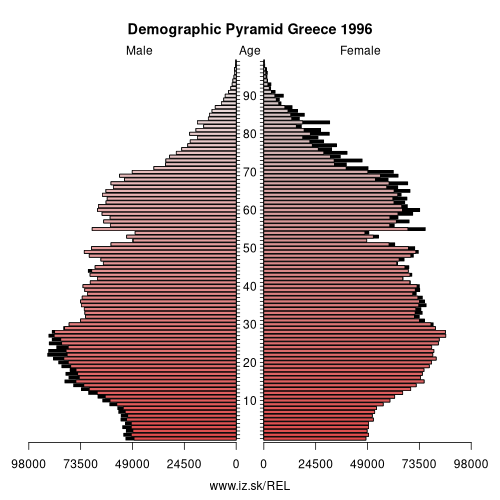
| Indicator | Period | Value |
|---|---|---|
| Demographics | ||
| number of inhabitants | 2025 | 10 372 335 |
| population density | 2023 | 80 |
| old-age dependency ratio | 2025 | 37.4 |
| Population ageing | ||
| unemployment rate – over 55 years | 2025q3 | 6.3 |
| aggregate replacement ratio | 2024 | 0.84 |
| aggregate replacement ratio – females | 2024 | 0.79 |
| life expectancy of a 50 year old | 2023 | 33.3 |
| healty life expectancy at 50 years | 2023 | 19.7 |
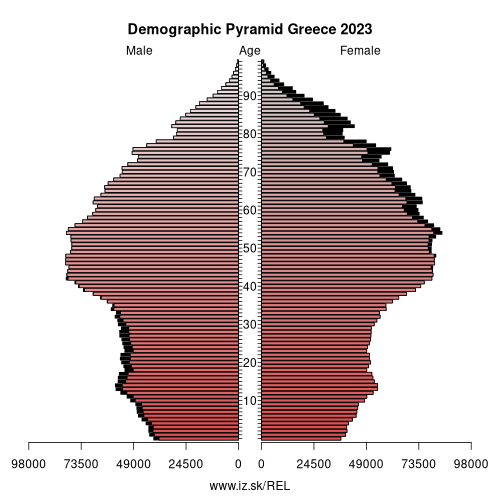
Employment by sectors, Greece
| NACE r2 | % | NACE r2 | % | ||
|---|---|---|---|---|---|
| A | 469.6 | 11% | B-E | 513.1 | 12% |
| F | 185.8 | 4% | G-I | 1355.8 | 32% |
| J | 106.6 | 2% | K | 82.6 | 2% |
| L | 11.5 | 0% | M_N | 383.8 | 9% |
| NRP | 2.6 | 0% | O-Q | 994 | 23% |
| R-U | 170.5 | 4% | TOTAL | 4276 | 100% |
Data for the period year 2024. Source of the data is Eurostat, table [lfst_r_lfe2en2].
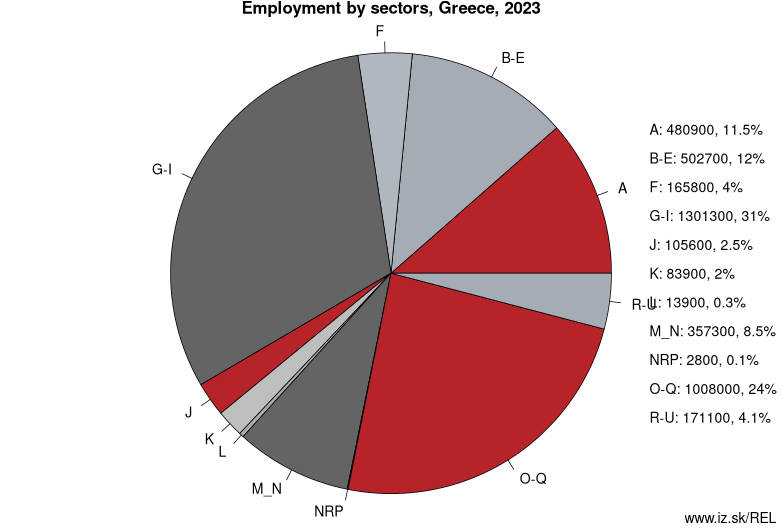
From Wikipedia :
Greece, officially the Hellenic Republic (Greek: Ελληνική Δημοκρατία), also known as Hellas (Greek: Ελλάς), is a sovereign state located in Southern and Southeast Europe. Its population is approximately 10.7 million as of 2018; Athens is the nation's capital and largest city, followed by Thessaloniki.Situated on the southern tip of the Balkan Peninsula, Greece is located at the crossroads of Europe, Asia, and Africa. It shares land borders with Albania to the northwest, North Macedonia and Bulgaria to the north, and Turkey to the northeast. The Aegean Sea lies to the east of the mainland, the Ionian Sea to the west, the Cretan Sea and the Mediterranean Sea to the south. Greece has the longest coastline on the Mediterranean Basin and the 11th longest coastline in the world at 13,676 km (8,498 mi) in length, featuring a large number of islands, of which 227 are inhabited. Eighty percent of Greece is mountainous, with Mount Olympus being the highest peak at 2,918 metres (9,573 ft). The country consists of nine geographic regions: Macedonia, Central Greece, the Peloponnese, Thessaly, Epirus, the Aegean Islands (including the Dodecanese and Cyclades), Thrace, Crete, and the Ionian Islands.
Greece is considered the cradle of Western civilisation, being the birthplace of democracy, Western philosophy, Western literature, historiography, political science, major scientific and mathematical principles, Western drama and notably the Olympic Games. From the eighth century B.C., the Greeks were organised into various independent city-states, known as poleis (singular polis), which spanned the entire Mediterranean region and the Black Sea.
Other: Greece, European Union, Estonia, Spain
Neighbours: Albania, North Macedonia, Bulgaria, Turkey
Subregions: Attica Region, Aegean Islands and Crete, Northern Greece, Central Greece
Suggested citation: Michal Páleník: Europe and its regions in numbers - Greece – EL, IZ Bratislava, retrieved from: https://www.iz.sk/PEL, ISBN: 978-80-970204-9-1, DOI:10.5281/zenodo.10200164

 Share
Share Facebook
Facebook Twitter
Twitter News
News